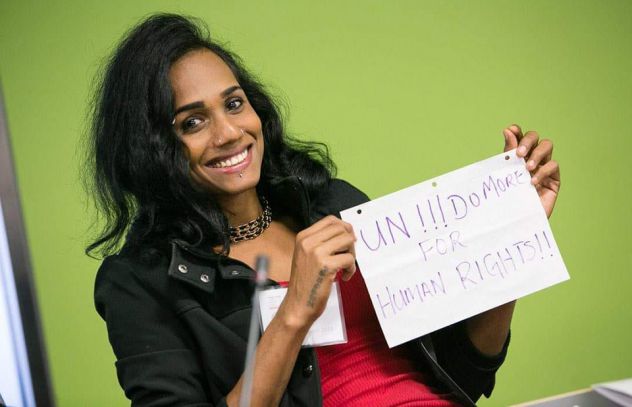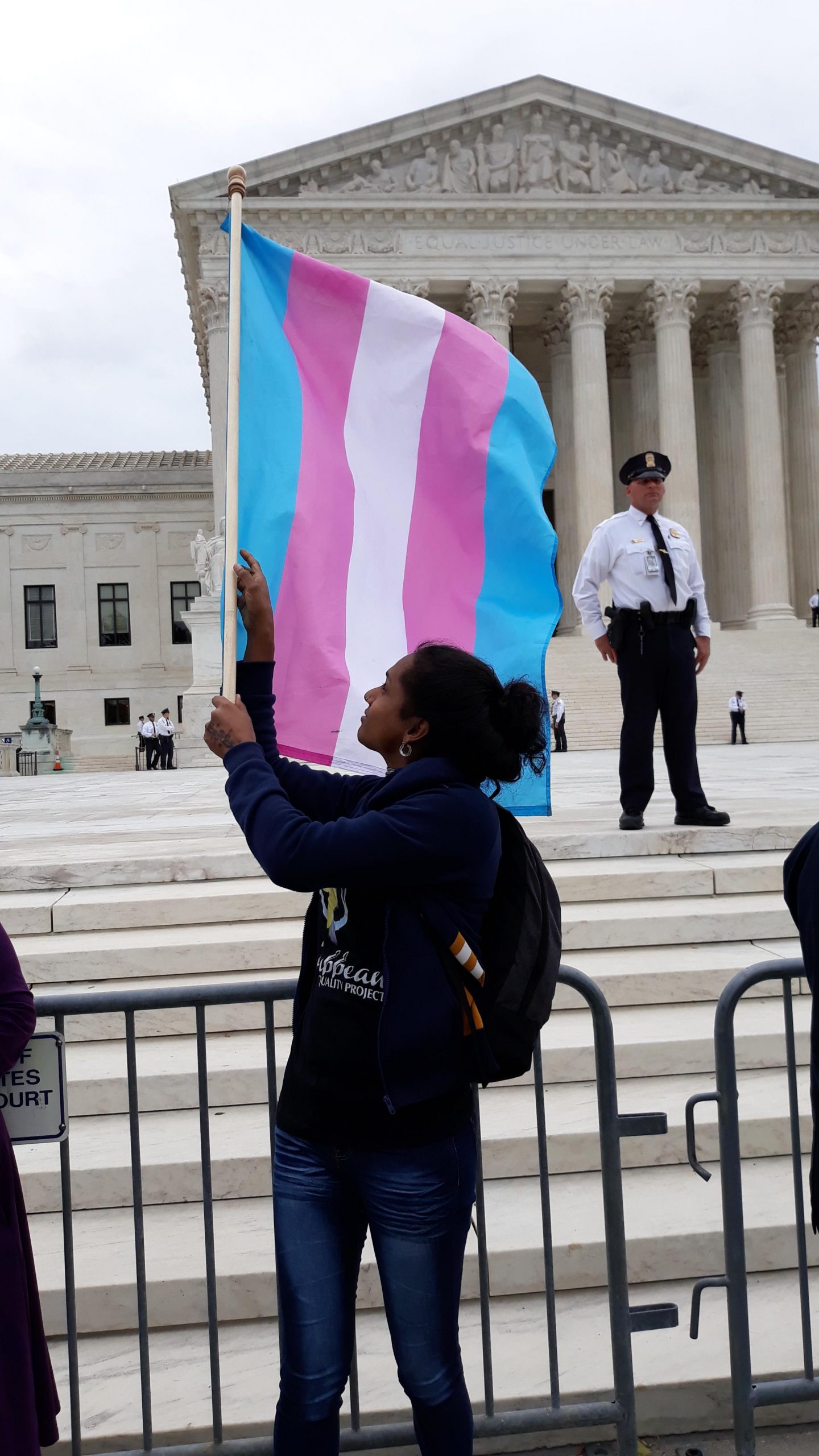June 17, 2020
“I hope to become a constitutional and criminal justice attorney,” says human rights activist and Borough of Manhattan Community College (BMCC/CUNY) Communications major Twinkle Paul. “I was a high school dropout back home in Guyana. I wanted to finish high school there but I couldn’t, because of the discrimination I faced as a transgender student. Someday, I want to be able to defend myself legally and defend others, as well.”
Having been “put out at age 16,” as she describes it, Paul found herself suddenly on the street when her family rejected her.
“I knew from my earliest memories who I am, but there was never a space to have that conversation,” she says. “Once I was thrown out of my family’s house, I made attempts to get jobs and the first thing people would ask is, ‘Are you a boy or girl?’ For many transwomen, sex work is the only way to survive and that is very dangerous.”
These experiences strengthened Paul’s determination to make the world safer for transwomen, and she went on to become an activist in Guyana, working with the Society Against Sexual Orientation Discrimination (SASOD) and Guyana Trans United (GTU).
 Joining activist communities in New York City
Joining activist communities in New York City
In 2018, at the age of 24, Paul moved to New York City and continued her activism.
“I was struggling back home mentally — it was mostly being stressed about safety,” she says.
In New York, she was able to find a social worker and a primary care doctor who enabled her to access counseling and hormone therapy. She also started working at the Gay Men’s Health Crisis (GMHC) as a member of their outreach team.
“We would go to different places telling people about our programs to prepare them to re-enter the workforce,” she says. “As a speaker, I visited homeless shelters and housing facilities, as well as city-funded housing for homeless people.”
She also joined the trans rights movement. “Groups like the Caribbean Equality Project and the Black Trans Media inspired me, helped bring me into activism,” says Paul.
Through that work, she met Ceyenne Doroshow, founder of Gays and Lesbians Living in a Transgender Society (GLITS Inc), and a community leader Paul refers to as her “trans mother,”
“Ceyenne is a strong transgender activist and her work also addresses issues like helping transpersons to be released from jail, decriminalization and trans equity,” Paul says.
Working closely with Doroshow, Paul initiated a project in which she raised emergency funds for displaced and crisis-affected transwomen in her home country.
“Ceyenne helped me set up a GoFundMe, and with her support we were able to raise funds for transpersons struggling now in Guyana,” Paul says. “We have raised just over $5,000, to provide two months of supplies, hygiene products, rent and food for at least 30 persons for two months.”
In Guyana, she explains, because of the lack of access to hormone therapy, “It’s a little easier for transwomen to survive and access hormone treatment in neighboring Suriname — and now because of COVID they are stuck in Suriname, away from their support network and friends.”
Paul has also distributed funds to six transwomen in Suriname who need immediate rental assistance.
 The intersection of Trans and Black Lives Matter movements
The intersection of Trans and Black Lives Matter movements
Recently, Paul has taken part in Black Trans Lives Matters protests and gatherings in New York City that have emerged in response to the murder of George Floyd and Black Trans Persons, by the police and society.
“I’m a little hoarse because I was streets yesterday, shouting solidarity,” says Paul. “I was in Manhattan, midtown marching for a transman shot by the police, Tony McDade in Miami. I was also there to honor Nina Pop, a transwoman from Missouri who was stabbed to death in May. We marched for every Black trans person who has been murdered.”
This is what it means to be part of an intersectional movement, Paul explains. “It’s one thing to be a Black person in this country but it’s two things to be Black and trans.
That identity in a transphobic, racist culture takes its toll, Paul says, but after participating in one of the marches, “I woke up the next day feeling so much better,” she says. “The momentum on the street was so exciting. People were clapping, buses were honking their horns. We all ended up at Union Square — the heterosexual community and the trans community united with one goal — to end the injustice that Black people face.”
Because of her immigration status, Paul is concerned about getting arrested. “But still, I feel I have to be in the street calling my people’s names,” she says.One morning, she says, “I started alone at the precinct in my neighborhood, holding a sign that said, ‘Stop Killing my Black Family.’ Black Trans Media was there and they supported me.”
In the end, Paul says, “Community support keeps me strong.”
She also reminds herself of the bigger picture. “I remember what it is like to be a transwoman in Guyana, and everywhere you go, people will be shouting at you on the street. You can’t get a job, or any kind of formal employment. People won’t hire you if you’re wearing female clothing.
I can’t leave them behind. My goal of a law degree to help them, keeps me pushing on.”
College is her number one priority
When Twinkle Paul entered BMCC, she began in the Center for Continuing Education and Workforce Development, where she earned a High School Equivalency (HSE) diploma.
“I would definitely recommend BMCC as a safe space for persons of my experience,” she says. “I built a relationship with the staff and teachers there, and recommended the Center to a gay friend and a trans friend who wanted to get their high school diploma.”
In November 2019, Paul spoke with the Caribbean Equality Project at a New York City Council hearing on trans issues, “Gender Equity in NYC: Access, Resources and Support for Transgender and Gender Non-Conforming New Yorkers.” Also present was BMCC Professor Brianne Waychoff and theatre major Simone Zalusky.
In Spring 2020, Paul entered BMCC as full-time Communications major, working toward her associate degree.
“College is my number one priority,” she says, and she has kept that priority even as she participated in historic protests to fight racial injustice and protected her health in a global pandemic that disproportionately affects communities of color.
“The transition to online learning because of the Covid pandemic was kind of hard,” she says. “I struggled through it and managed to earn an ‘A’ in all my classes — mass media, communication 245, English 101, math, speech and Spanish.”
One step at a time, she is working toward her ultimate goal of fighting injustice through the legal system.
“People are suffering and being mistreated,” she says. “I want to help stop homophobia, transphobia and racism. With a law degree, I can take that work to another level.”
STORY HIGHLIGHTS
- After earning an HSE at the BMCC Center for Continuing Education and Workforce Development, Twinkle Paul entered the college as a communication studies major
- At age 16 in Guyana, she was rejected by her family and became an activist with trans rights organizations there
- Today she continues her activism and plans to earn a law degree so she fight for trans rights in court

